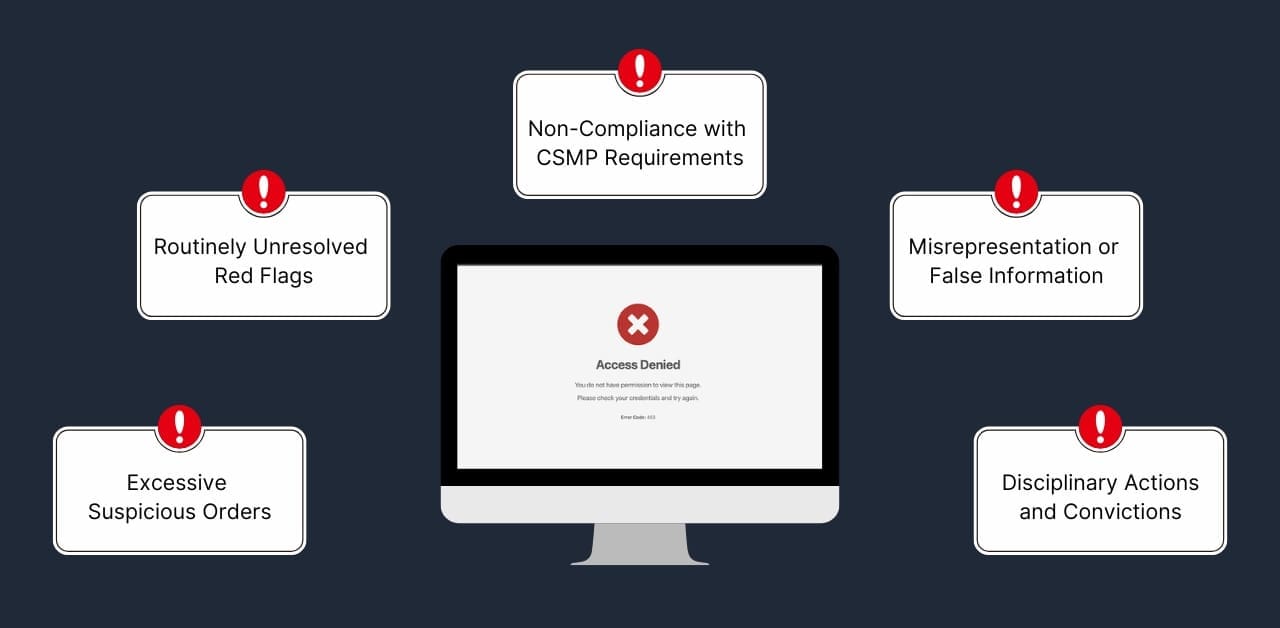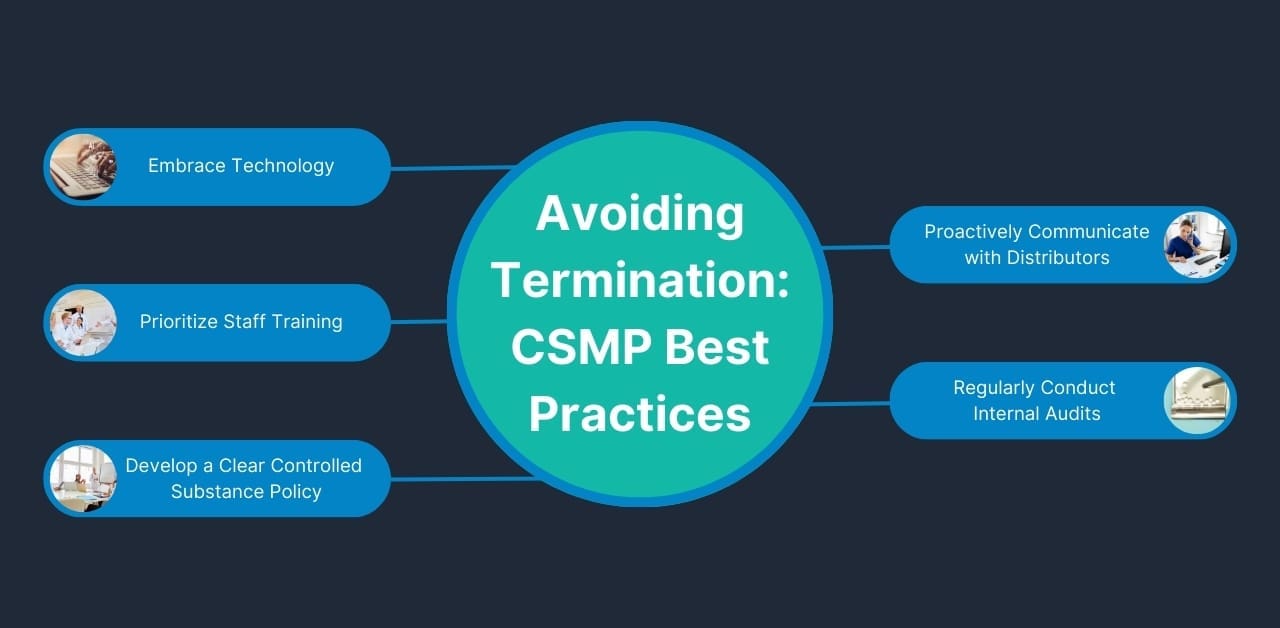Losing the ability to order controlled substances is a nightmare scenario for any pharmacy. It disrupts patient care, damages reputation, and even threatens business survival. That’s why it’s vital for pharmacists and staff to understand the termination policies of the Controlled Substance Monitoring Program (CSMP) and take proactive steps to ensure compliance.
This final installment of the CSMP blog series equips retail pharmacists and their staff with the knowledge and tools needed to maintain controlled substance compliance and develop effective pharmacy guidelines to avoid CSMP termination.
Understanding the CSMP Termination Policy from a Distributor’s Perspective
The CSMP outlines clear guidelines for distributors when determining whether to terminate a customer’s eligibility to receive controlled substances. These guidelines prioritize patient safety and aim to prevent diversion by identifying customers with persistent patterns of concerning activity. Five potential termination triggers include:
1. Excessive Suspicious Orders:
A large percentage of a customer’s orders lack clear explanations or demonstrate a pattern of disregard for distributor warnings.
2. Routinely Unresolved Red Flags:
A customer continually fails to address issues identified as CSMP red flags, such as disproportionate ordering of controlled substances, unusual growth in orders, high cash payments for controlled substances, or concerning prescriber activity.
3. Non-Compliance with CSMP Requirements:
A customer refuses to cooperate with the distributor’s CSMP investigations, including failing to provide requested Pharmacy Customer Data (PCD) or other necessary documentation.
4. Misrepresentation or False Information:
A customer provides inaccurate or misleading information on the pharmacy questionnaire, which is used by distributors during the onboarding process.
5. Disciplinary Actions and Convictions:
A customer has been subjected to recent disciplinary actions by the State Board of Pharmacy related to controlled substance dispensing, including license probation or the termination of the owner or pharmacist-in-charge. Federal or state felony convictions related to controlled substances can also lead to termination.
The Implications of CSMP Termination for Pharmacies
CSMP termination from a distributor’s controlled substance program can have far-reaching consequences for retail pharmacies:
- Disruption of Patient Care: Inability to fill prescriptions for essential controlled medications, leading to patient suffering and potential liability.
- Reputational Damage: Loss of trust from patients and the community, negatively impacting the pharmacy’s standing.
- Financial Losses: Decreased revenue due to the inability to dispense controlled substances, which make up a significant portion of many pharmacies’ business.
- Potential Legal Actions: Investigations and penalties from regulatory authorities, including license suspension or revocation.
A Proactive Approach to Avoiding Termination
While the threat of CSMP termination may seem intimidating, it is entirely avoidable. By implementing robust pharmacy guidelines and actively engaging with distributors, retail pharmacies can demonstrate their commitment to responsible dispensing and mitigate this risk. Below are best practices that retail pharmacists and staff should consider integrating into their workflows:
1. Embrace Technology:
Pharmacies should prioritize implementing effective pharmacy management systems and dedicated controlled substance inventory management solutions. These tools automate record-keeping, streamline reporting, and proactively identify potential red flags, reducing the risk of errors and suspicious orders.
2. Prioritize Staff Training:
Investing in comprehensive training on controlled substance compliance protocols is essential. Key training topics include:
- CSMP Reporting and Data Requirements: Ensure all staff understand their purpose and importance.
- Red Flags and Thresholds: Train staff to recognize and address them before they escalate.
- Record Keeping Protocols: Emphasize meticulous and accurate documentation for all controlled substance transactions.
3. Develop Pharmacy Guidelines:
Create and enforce robust pharmacy guidelines that outlines procedures for every aspect of controlled substance handling. An effective policy should cover:
- Ordering and receiving procedures.
- Inventory management and reconciliation.
- Dispensing protocols and patient counseling.
- Security measures to prevent theft and diversion.
- Disposal and waste management procedures.
4. Proactively Communicate with Distributors:
Maintain open communication with distributors, notifying them of any anticipated increases in controlled substance orders or operational changes that could impact ordering patterns. This proactive approach prevents misunderstandings and helps avoid unnecessary delays or investigations.
5. Regularly Conduct Internal Audits:
Retail pharmacies should routinely audit their controlled substance practices to identify vulnerabilities and areas for improvement. Proactively addressing issues helps prevent regulatory scrutiny and strengthens compliance efforts.
Conclusion
CSMP termination doesn’t have to be inevitable. By adopting a proactive mindset, implementing pharmacy guidelines, and fostering a culture of compliance, pharmacies can successfully navigate the CSMP and ensure their continued ability to provide essential medications to their patients.


